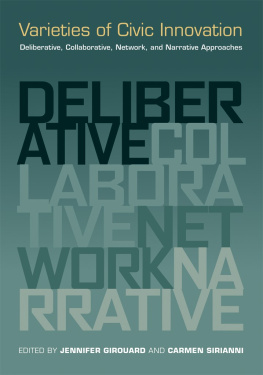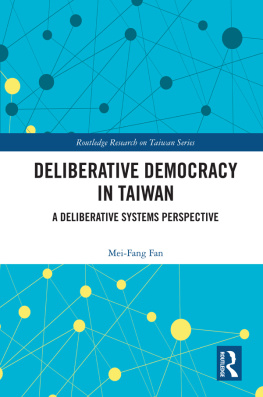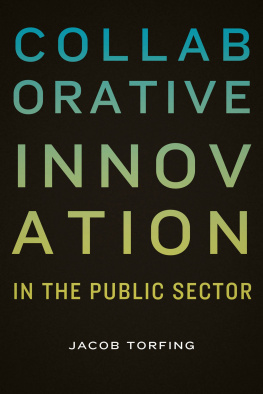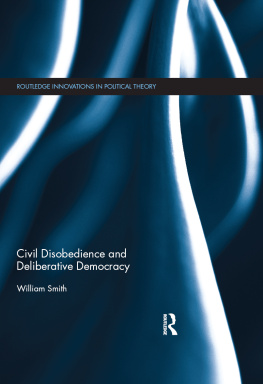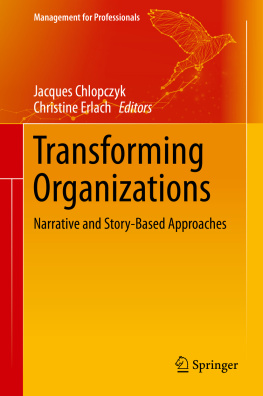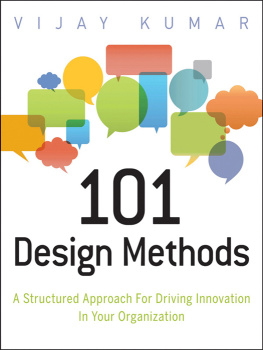2014 by Vanderbilt University Press
Nashville, Tennessee 37235
All rights reserved
First printing 2014
This book is printed on acid-free paper.
Manufactured in the United States of America
Library of Congress Cataloging-in-Publication Data on file
LC control number 2014008052
LC classification number JF1525.P6V36 2014
Dewey class number 320.6dc23
ISBN 978-0-8265-1999-3 (cloth)
ISBN 978-0-8265-2000-5 (paperback)
ISBN 978-0-8265-2001-2 (ebook)
Acknowledgments
The Ash Center for Democratic Governance and Innovation, John F. Kennedy School of Government, Harvard University, provided a welcome home while this volume was being prepared. It also sponsored several talks (followed by probing dinner conversations) that became chapters in the book. Special thanks to Archon Fung, Jenny Mansbridge, and Bruce Jackan, as well as to the regular participants in the Ash Centers Democracy Seminar. We would also like to thank the Thomas and Jane Norman Fund for Faculty Research at Brandeis University for financial support in preparing this volume. Matt Leighninger provided detailed and astute comments on the manuscript as a whole. Mike Ames, director of the press, proved yet again to be a most valued partner and critical thinker. Others at the press helped bring this to fruition, especially Joell Smith-Borne and Drew Bryan. Our biggest debt is to the contributors for sharing their research and extending the conversation on civic innovation.
JENNIFER GIROUARD
CARMEN SIRIANNI
Waltham, Massachusetts, February 4, 2014
Introduction
JENNIFER GIROUARD AND CARMEN SIRIANNI
Over the past decade, residents in Seattle have generated a rich civic ecology of new communications media aligned with some of the traditional newspaper and broadcast media to enhance the public sphere for democratic deliberation and civic action. They have done this through irrepressible grassroots technological innovation, institutional collaboration with universities and libraries, and support from the community technology program, an office of city government modeled partly on Seattles famed neighborhood matching fund and participatory planning system that emerged in the prior two decades. In Brazil, not only do several hundred cities now engage in participatory budgeting, where, beginning in Porto Allegre in 1989, citizens themselves deliberate and decide upon local development priorities, but over the past decade a broad array of national policy conferences also helps inform the parameters of debate and action by legislative and administrative bodies on questions of economic development, health, and minority rights. These policy conferences operate through sequenced forums designed for deliberation and learning at all three levels of the federal systemmunicipal, state, and nationalopening up a broad horizon for grassroots and stakeholder participation alongside core institutions of representative democracy and administrative accountability.
Such innovations, and many more in this collection and other studies, signal an era of democratic innovation and social learning (Sirianni and Friedland 2001), even as many components are not yet strongly embedded in communities or translocal networks, not yet inclusive or accountable enough to secure democratic equality, not yet linked enough to transform entire institutional fields, such as the bureaucracy, the law, the market, the educational system, and other actors (Sirianni 2009; Fligstein and McAdam 2012; Ansell and Gash 2007). Democratic innovationas was typical in Jeffersonian, Populist, Progressive, and 1960s eras in the United Statesremains uneven and uncertain, open to unexpected pathways and unintended consequences, entangled in various local and state political cultures and diverse institutional fields. Not yet holds out the promise of further refinement and institutionalization, while transforming civic identities and professional and organizational cultures (Dzur 2008; Boyte 2005). But the phrase should never betray a sense of inevitability. Our democracies are battered by gale force winds of various types, not least those literal storms that that will tax our civic and democratic institutional capacities to adapt to climate change, even as we seek to mitigate it. Even if we begin to mitigate in reasonably hopeful long-term ways, we will be terribly challenged to adapt to the highly disruptive community, regional, cultural, ecological, economic, and distributive costs already under way, and to do so in a manner that enhances democratic legitimacy and restrains conflict within appropriate limits. Indeed, successful climate adaptation is likely impossible without further civic and institutional innovation of the kinds that we examine in this collection.
More generally, the challenge of innovating well and aligning new models with other democratic institutions is momentous. Nothing has been easy or inevitable. As our contributors to this volume recognize, despite some of their different approaches, civic innovation can widen our opportunities for genuine democratic reform. But only a hardheaded analysis of limits, obstacles, and tradeoffs can yield sustainable and systemic change.
Our contributors come at these questions from various though often complementary angles. Elena Fagotto and Archon Fung, for instance, utilize the concept of embeddedness to capture the ways that innovations take root in local environments. They argue that successful interactions are repeated across time, are anchored in community institutions, and encompass multiple issues. Fagotto and Fung examine nine long-term cases of deliberation with substantial impacts on their communities, including Issue Forums in West Virginia, Hawaii, and South Dakota, and study circles in Delaware and Maryland. In doing so, they locate a number of shared characteristicshaving a key catalyst (political authority) and institutional support (capacity)and reveal the importance of institutional investment. Several intermediariessuch as AmericaSpeaks, Everyday Democracy, and the National Issues Forumswork across the field of deliberative innovation to ensure transfer of best practices and critical reflection from community to community, issue to issue, even model to model (see also Leighninger 2006; Nabatchi et al. 2012).
Carmen Sirianni examines a series of related capacity-building challenges by focusing on two programs (watersheds, environmental justice) within the US Environmental Protection Agency that seek to coproduce tools and training for local groups and fund leadership and organizational development, but also across a larger field through national and regional intermediaries (River Network, Southeast Watershed Forum), as well as through state-based agencies and civic intermediaries (Colorado Watershed Assembly). Siriannis analysis complements local embeddedness in Fagotto and Fung with agency-wide and field-wide questions of institutional capacity, mix, and configuration. His analysis challenges stale understandings of bureaucratic organization by examining agency-wide networked team design and collaborative governance. In the process, he expands the normative basis for theorizing robust civic democracy to include national public agencies.

